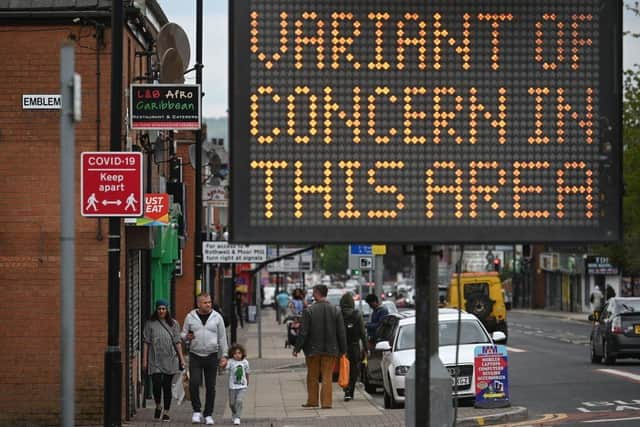Indian variant UK: cases rise to 3,424 as infections surge by more than 2,000 in week
This article contains affiliate links. We may earn a small commission on items purchased through this article, but that does not affect our editorial judgement.
and live on Freeview channel 276
Cases of the Indian Covid variant have increased by more than 2,000 in the space of a week, latest figures from Public Health England (PHE) show.
Weekly data shows there are now a total of 3,424 cases of the B.1.617.2 variant in the UK, with most cases concentrated in the North West and London, although ‘clusters’ are now appearing across the country.
Advertisement
Hide AdAdvertisement
Hide AdThe figures are up to 19 May and mark a rise of 2,111 cases on the previous week.


On Thursday (20 May), Health Secretary Matt Hancock revealed infections had increased from 2,323 on Monday (17 May), to 2,967.
In England, 3,245 cases have now been confirmed, along with 136 in Scotland, 28 in Wales and 15 in Northern Ireland.
The figures come amid reports that for three weeks in April and May, eight local authorities in England - including Blackburn with Darwen, where cases are high - did not have access to the full data on positive tests in their area, meaning more than 700 cases were not reported or traced locally.
Advertisement
Hide AdAdvertisement
Hide AdThe BBC said a report into the reporting glitch at one of the councils affected concluded that the rapid spread of the Indian strain within its boundary was “exacerbated by the sporadic failure of the national Test and Trace system”.
However, Downing Street has denied that the NHS Test and Trace “temporary delay” in alerting local authorities in hotspot areas to positive cases helped contribute to the spread of the Indian variant.
The government said that only a small number of authorities had been involved and that the issue had been “quickly resolved”.
Where have cases been found?
The North West of England has recorded the most number of cases of the variant, with Bolton, Blackburn with Darwen and Bedford among the worst affected.
Advertisement
Hide AdAdvertisement
Hide AdSurge testing and vaccinations are now underway in six new areas in England to try and control the spread, including Bedford, Burnley, Hounslow, Kirklees, Leicester and North Tyneside. This is in addition to Bolton and Blackburn.
In Scotland, Scottish authorities are taking similar action in Glasgow and Moray.
In the last week across Bolton and Blackburn with Darwen, 26,094 vaccinations have been given, while an extra 75,000 have been delivered.
Dr Meera Chand, the Covid-19 incident director at PHE, said it was essential people in the worst-affected areas who had yet to receive their second dose of the vaccine came forward as soon as it was offered.
Advertisement
Hide AdAdvertisement
Hide AdShe said: “This is vitally important in the light of our current assessment that (B1617.2) has grown rapidly in England and may be highly transmissible.
“PHE will continue to monitor all variants closely, paying particular attention to the impact on hospitalisations and deaths which will help us to understand the protective effects of the vaccine.”
PHE also said it was investigating another new variant after 49 cases were identified, mostly in Yorkshire and the Humber region.
So far, there is no evidence that it causes more severe disease or renders the vaccines less effective.
Advertisement
Hide AdAdvertisement
Hide AdThe latest figures come as a member of the Government’s Scientific Advisory Group for Emergencies (Sage) warned the country could be seeing the start of a third wave of the pandemic.
Professor Andrew Hayward, an infectious diseases expert at University College London, said he was “very concerned” about the rise of the Indian variant and new measures could be required to bring it under control.
He said it would become apparent over the next one to two weeks whether localised outbreaks of the variant would become more generalised.
Speaking to the BBC, he said: “Obviously we’re doing everything we can to contain the spread of that, but it’s likely that more generalised measures may start to be needed to control it.
Advertisement
Hide AdAdvertisement
Hide Ad“So whilst I think we’ve always thought that we would have another wave of Covid, the size of that wave is going to very much depend on how transmissible the variant that causes it is and what proportion of the population have been vaccinated when it hits.
“Fortunately we’ve had a good proportion of the population vaccinated, but there’s still people who aren’t vaccinated in high-risk groups, the vaccine isn’t 100 per cent effective, and also even in the younger groups, if you get many, many thousands or hundreds of thousands of cases, then you will expect a lot of hospitalisations and deaths to result from that.”
A message from the editor:
Thank you for reading. NationalWorld is a new national news brand, produced by a team of journalists, editors, video producers and designers who live and work across the UK. Find out more about who’s who in the team, and our editorial values. We want to start a community among our readers, so please follow us on Facebook, Twitter and Instagram, and keep the conversation going.